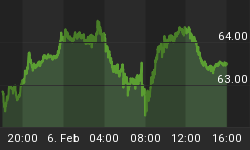Below is an excerpt from a commentary originally posted at www.speculative-investor.com on 9th April 2009.
Former Fed Chief Alan Greenspan has stridently argued that his decision to lower the Fed Funds Rate (FFR) from 6.5% to 1.0% during 2001-2003 was NOT the cause of the housing bubble. Does his argument have any validity?
In one respect, yes; there were powerful forces at work in addition to what the Fed was doing with short-term interest rates, so it is overly simplistic to argue that the Fed's interest rate manipulations during the early years of this decade CAUSED the housing bubble. Rather than pointing the finger of blame at any single Fed action, we think it is more appropriate to view the Fed as the 'great enabler' of the range of monetary excesses that led to the bubble and the subsequent bust.
Having said that, we strongly believe that the Fed erred badly when setting its interest-rate target during the first half of this decade. Specifically, it is clear to us that the Fed held its official target rate too low for too long during much of 2001-2005. To support our claim we present, below, a chart comparing the FFR target with something called the Future Inflation Gauge (FIG). The Future Inflation Gauge is calculated by the Economic Cycle Research Institute (ECRI) and is an attempt to quantify that future EFFECTS of inflation.
Our chart begins in 1994, but note that the FFR had been trending up and down with the FIG from the time Greenspan took the helm of the Fed in 1987. Towards the end of 2001, however, the two began to head in opposite directions. The chart's message is that the Fed continued to lower the FFR during 2002-2003 even though the inflation threat was growing, and then held the FFR at an unreasonably low level throughout 2004 and the first half of 2005.

The FIG-FFR comparison suggests that the Fed should have ended its rate cutting in October of 2001, when the FFR was 2.5%, and should have begun to hike rates during the first half of 2002. However, there is a far bigger issue here. The Greenspan Fed may well have erred in a major way when determining its interest rate target during the first half of this decade, but the more important point is that it will never be possible for the Fed or any other agency to determine the correct interest rate. This is because the correct interest rate is the one that would be set by the market in the absence of the Fed. We've always thought it strange that people who clearly understand why it would make no sense for a government agency to set the price of eggs (or any other good/service) fool themselves into believing that a government agency should have the power to set the price of credit.
Alan Greenspan has a unique opportunity right now, which, unfortunately, he will almost certainly let pass. Regardless of how aggressively he argues to the contrary, he will go down in history as the Fed chairman who blundered so badly that he set the scene for the second Great Depression. There is nothing he can do about that now. What he can do is to not only admit the mistakes that were made under his stewardship, but to explain that, regardless of how many resources are brought to bear and the intelligence of the people involved, such mistakes will inevitably occur when you give a person or a group of people the power to override the market. If he did that he would make up for decades of wrong-headedness.
We aren't offering a free trial subscription at this time, but free samples of our work (excerpts from our regular commentaries) can be viewed at: http://www.speculative-investor.com/new/freesamples.html.















